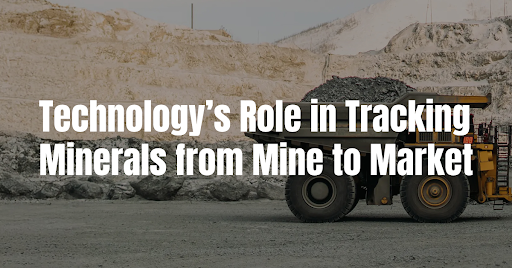
Responsible sourcing has become a global priority, with governments, industries and consumers wanting to know the origin of minerals and if they were responsibly sourced. This demand has put a lot of pressure on manufacturers to provide transparency into their supply chain. Transparency is not easy to achieve, since minerals may change hands a number of times before they are included in a finished product. Technology is disrupting this. With everything from blockchain to hard data management systems, digital tools enable the tracking of minerals at each phase.
Companies investing in conflict mineral compliance solutions are now able to trace materials from the mine to the marketplace in a way that is increasingly more precise, efficient and accountable.
Why Tracking Minerals Matters
The difficulty is embedded within the intricacy of supply chains. Tantalum, tin, tungsten, and gold known as 3TG minerals can travel through multiple intermediaries such as smelters, refiners, distributors and manufacturers. Without visibility, it can be hard to know if these minerals originated from conflict-affected regions, where the mining may finance armed militias or workers may have been exploited.
In addition to the ethical issues, failure to trace minerals can lead to regulatory violations. Frameworks such as the U.S. Dodd-Frank Act, EU Conflict Minerals Regulation and industry initiatives like Responsible Minerals Initiative (RMI) all require companies within the value chain to identify the source of minerals through purchasing records.
This is the role of technology. It will add the ability to collect, verify and manage supply chain information.
Blockchain for Secure Traceability
The development of blockchain technology has been a key enabler of visibility in supply chains. Its distributed ledger guarantees that every transaction is securely recorded, and that no one can arbitrarily change it.
How does it work: Each time a mineral is transferred or sold from one entity to another, that transaction is recorded in the blockchain. Along with the value, there will be key details from origin, processing facility through to transfer of ownership.
Why does that matter: Because the process is immutable, participants can be reasonably sure that the data has not been tampered with. This builds trust with suppliers, manufacturers, regulators and consumers.
Disciplines of supply chains such as electronics, automotive and aerospace are all developing blockchain-based applications to help support compliance.
IoT and Real-Time Monitoring
An important technology to know is the Internet of Things (IoT). By utilizing smart tags, GPS trackers or other sensors, companies can track minerals as they travel across borders, and as they travel between different sites.
- Real-time benefits: IoT devices can report location, update the environmental conditions, and provide updates for chain-of-custody. This is intended to mitigate the possibility of materials being swapped out or misrepresented.
- Practical application: For example, smelters could place IoT monitoring systems that tracked batches of ore, and enabled a verification that inputs were from certified sources.
This real-time tracking gives you more opportunity to have a better connection of the raw materials to the final products for compliance reporting.
Data Management and Reporting Systems
Tracking minerals encompasses consolidation, data entry, organization, analysis and reporting data to comply with standards, which is where robust data management systems can be extremely useful.
- Automation: They eliminate compilation and heap reporting of supplier reports and validate entry.
- Integration: Enterprise applications (ERP, PLM), provide data up- and down-stream in the enterprise and inhibit information in putting data into data silos, as well.
- Regulatory alignment: reports created from data management systems can be printed in match international compliance formats.
The digital basis reduces human error, quickens audits and improves accountability throughout the supply chain.
AI and Predictive Analytics
Artificial intelligence (AI) provides an additional layer of functionality. Machine learning models may identify anomalies in the data, predict risks and flag the suppliers who might have compliance risks.
As an example, AI solutions will notify compliance teams to investigate when a shipment does not conform to the projection expected. Additionally, predictive analytics can analyze upcoming risks based on geopolitical events and past history of suppliers.
By taking a proactive approach organizations may consistently reduce compliance failures as this happens.
Challenges in Implementation
Technology might offer a variety of powerful tools, yet the corporate organizations are often confronted with a number of problems while trying to adopt them.
Even though technology is capable of providing robust answers, companies still find themselves stumbling over walls when it comes to the implementation of such solutions.
- Mixing digital solutions with old systems can complicate the whole implementation process, thus allowing only some functions to work well.
- The reliability of the data depends largely on how much the suppliers are willing to collaborate, and this is not always the case.
- Technology cost might be one of the reasons to block the way of the seller, especially if it is a small seller.
These hurdles are pointing out the crucial need for using the services of professional partners who are always ready to help in the adoption, change, execution of solutions and ensuring compliance.
Technology is changing how minerals are traced from mine to market, from blockchain and IoT to AI-enabled compliance platforms. However, managing technology entails technical skills and knowledge of regulation – it’s where trusted stakeholders become valuable.
Sunstream, with proven capabilities in product material compliance like RoHS REACH, SDS services and compliance-driven digital solutions, is here to help businesses develop transparent, efficient supply chains, while being prepared for the future. By drawing on technology and domain expertise, Sunstream will ensure that companies will not only comply with global regulations, but also develop enduring trust with customers and stakeholders.




 +1.585.935.7123
+1.585.935.7123 +91-804-148-6861
+91-804-148-6861